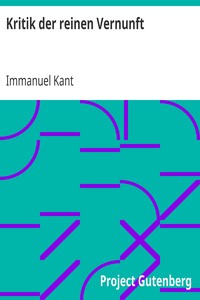Kritik der reinen Vernunft by Immanuel Kant
"Kritik der reinen Vernunft" by Immanuel Kant is a philosophical treatise written during the late 18th century, marking a pivotal moment in Western philosophy. The work explores the foundations of metaphysics and epistemology, specifically focusing on the nature and limits of human understanding, a priori knowledge, and the relationship between experience and reason. The opening of the text provides a detailed introduction to Kant’s philosophical project, positing the need for a critique
of pure reason to establish the limits and capabilities of human knowledge. Kant distinguishes between empirical knowledge, derived from experience, and a priori knowledge, which exists independently of experience. He introduces critical concepts such as synthetic and analytical judgments, emphasizing that a true understanding of metaphysical principles requires a rigorous examination of their validity and applicability. By laying out the purpose and framework of his critique, Kant sets the stage for a deep inquiry into how we acquire knowledge and the implications of that knowledge for philosophy and science. (This is an automatically generated summary.)
Read now or download (free!)
| Choose how to read this book | Url | Size | ||||
|---|---|---|---|---|---|---|
| Read online (web) | https://sendtokindle.compellingsciencefiction.com/ebooks/6343.html.images | 1.3 MB | ||||
| EPUB3 (E-readers incl. Send-to-Kindle) | https://sendtokindle.compellingsciencefiction.com/ebooks/6343.epub3.images | 498 kB |
Send
to kindle email: |
|||
| EPUB (no images, older E-readers) | https://sendtokindle.compellingsciencefiction.com/ebooks/6343.epub.noimages | 519 kB | ||||
| Kindle | https://sendtokindle.compellingsciencefiction.com/ebooks/6343.kf8.images | 903 kB | ||||
| older Kindles | https://sendtokindle.compellingsciencefiction.com/ebooks/6343.kindle.images | 863 kB | ||||
| Plain Text UTF-8 | https://sendtokindle.compellingsciencefiction.com/ebooks/6343.txt.utf-8 | 1.3 MB | ||||
| Download HTML (zip) | https://www.gutenberg.org/cache/epub/6343/pg6343-h.zip | 494 kB | ||||
| There may be more files related to this item. | ||||||
Similar Books
About this eBook
| Author | Kant, Immanuel, 1724-1804 |
|---|---|
| Title |
Kritik der reinen Vernunft
Zweite hin und wieder verbesserte Auflage (1787) |
| Note | Wikipedia page about this book: https: //en.wikipedia.org/wiki/Critique_of_Pure_Reason https: //de.wikipedia.org/wiki/Kritik_der_reinen_Vernunft |
| Note | Reading ease score: 45.0 (College-level). Difficult to read. |
| Credits | This text has been derived from HTML files at "Projekt Gutenberg DE", prepared by Gerd Bouillon |
| Language | German |
| LoC Class | B: Philosophy, Psychology, Religion |
| Subject | Knowledge, Theory of |
| Subject | Causation |
| Subject | Reason |
| Subject | Philosophy, German |
| Category | Text |
| EBook-No. | 6343 |
| Release Date | Aug 1, 2004 |
| Most Recently Updated | Dec 29, 2020 |
| Copyright Status | Public domain in the USA. |
| Downloads | 793 downloads in the last 30 days. |
| Project Gutenberg eBooks are always free! | |

